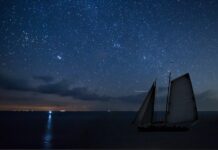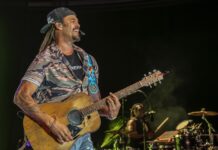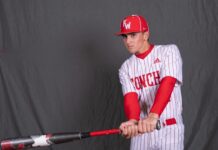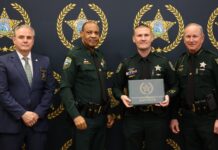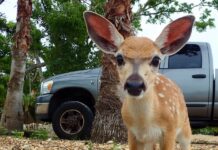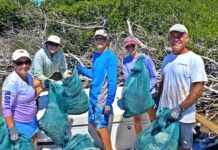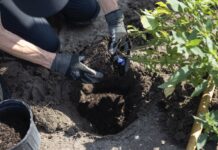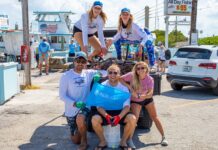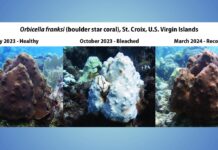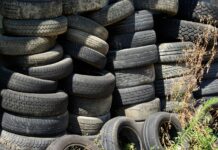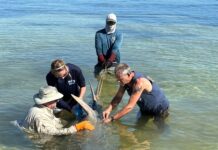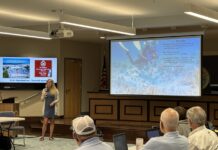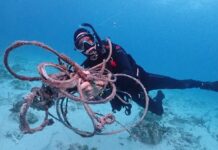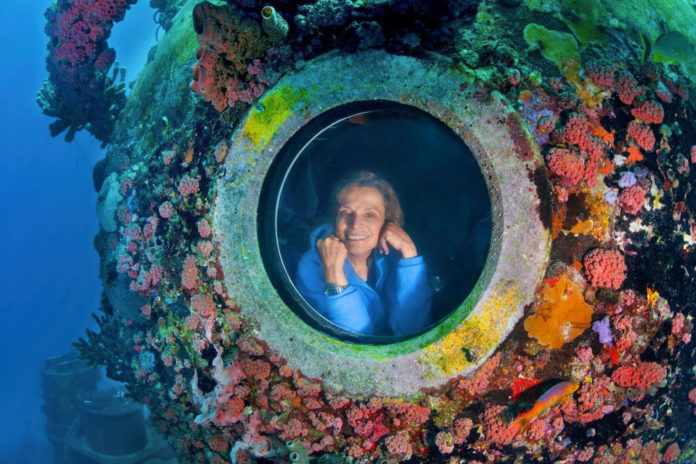
On Mon. Nov. 1, two pioneering female explorers will speak at FIU about exploration, conservation and how the two connect. In advance, both sat down with Keys Weekly to share more of their insights from lives lived in the field — Sylvia Earle, underwater, and Mireya Mayor, in jungles and fields — as well as their hope and advice for the Florida Keys.
Earle, famed oceanographer and National Geographic Explorer in Residence, is better known as “Her Deepness.” The living legend has led hundreds of research expeditions and spent more than 7,000 hours underwater. She was also NOAA’s first female chief scientist.
Mayor, the terrestrial counterpart lovingly called “Her Wildness,” is also no stranger to exploration. A primatologist and explorer, she co-discovered the world’s smallest primate: a species of mouse lemur in Madagascar. She served as National Geographic’s first female and first female Hispanic wildlife correspondent.
Working together, and with us locals, they believe we can still save what we have in front of us. Here’s what they had to say:
Keys Weekly: How did you begin exploring?
Sylvia Earle: I think everyone starts out exploring as a child — all of us. We want to know everything about everything. We ask questions: who, what, why, how, when, and, maybe most importantly, why not. Often, that curiosity gets discouraged as we grow up… I do what all kids and scientists do, I just never quite grew up.
KW: How do exploration and conservation connect? Do we need both?
Mireya Mayor: We need both. They serve a singular and dual purpose. Exploration leads you to new places, new animals, new discoveries. Conservation is there to protect those places, those animals, those people….Both are crucial to protecting our planet.
KW: Why should people care?
SE: Why should you care? Because everything ties together. It’s all a part of the network of life that keeps us alive.
MM: Exploration helps you realize that what happens on the other side of the world does have an impact on you locally — because everything is inextricably connected.
KW: What are you most proud of being known for?
SE: Maybe I’ll get there someday. Maybe it’s the next thing.
MM: I’m very proud of the trajectory I’ve taken into this field. I don’t have the typical scientist background, and that’s what I embrace. I’m a former Miami Dolphins cheerleader. Then I became known as the “Female Indiana Jones” — “Her Wildness.” I co-discovered the world’s smallest primate species. And I’m a mom of six, a title I’m incredibly proud of.
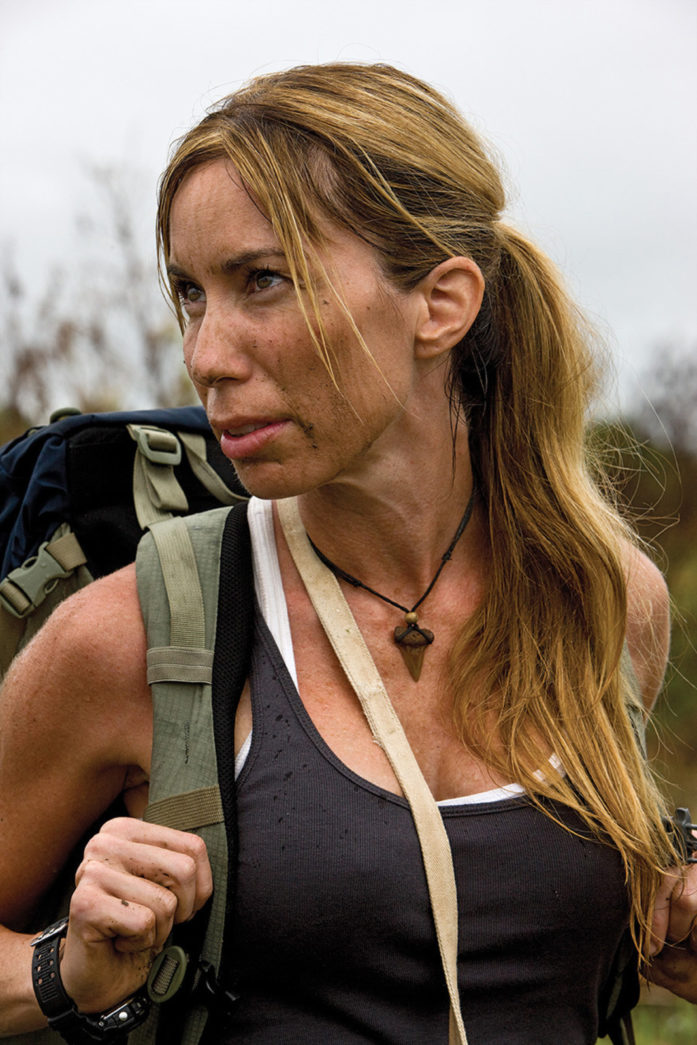
Explorer Mireya Mayor has been called the “Female Indiana Jones.” BRENT STIRTON/History 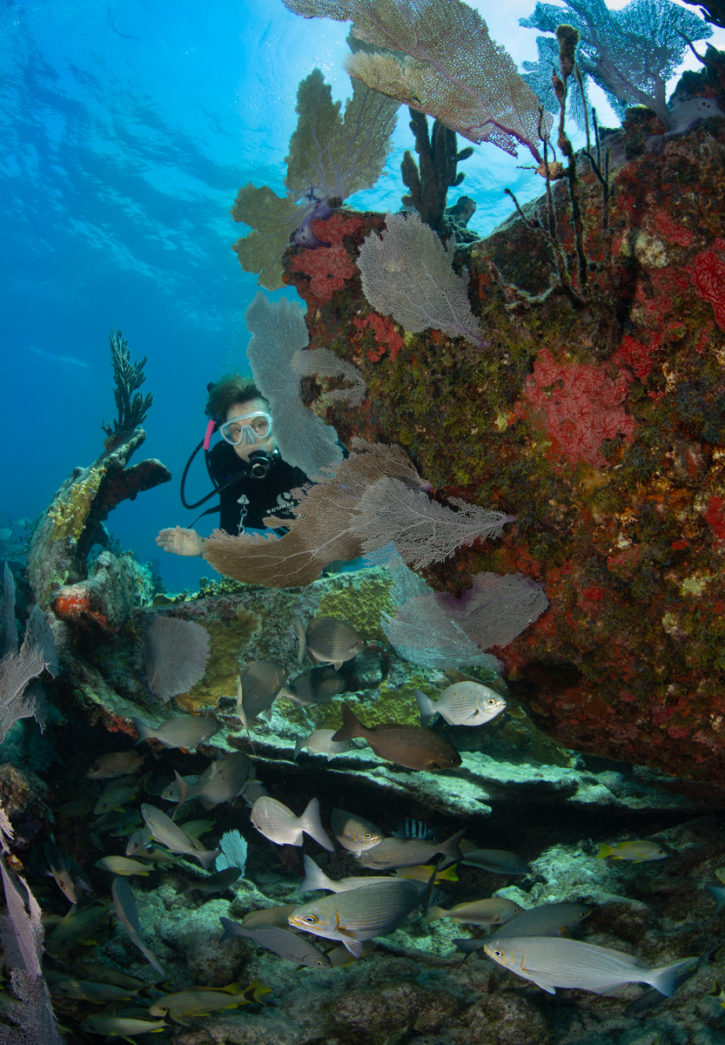
Sylvia Earle diving on a wreck full of fish life in Key Largo. STEPHEN FRINK ARCHIVE
KW: Do you have a favorite exploration memory?
MM: Trekking over 1,000 miles with the Masai has to be one of the most unbelievable experiences and memories of my life. I learned so much from them. When we go into ancient forests, we see trees; they see a medicine cabinet, a grocery store.
KW: You’ve been to Aquarius (an underwater scientific laboratory in Islamorada). Tell us about it.
SE: To really get to know individual animals, to realize their personalities and to see their place in the system around them and see how the system around them affects them, you need the gift of time. FIU gives us this within the ocean, with Aquarius. I’ve saturated at least 10 times. Staying a week underwater is barely the time we need to seriously understand the relationship between fish and their surroundings. Then, we can come back. It’s really a step in the right direction.
KW: What’s the most pressing environmental concern that we have?
SE: For the oceans, it’s what we put in (plastics) and take out (marine life)…. If we knew where fish came from, what that fish had been eating that’s on your plate, understood the hole in the ecosystem that you created when you consumed it, that it doesn’t recover — we might think twice instead of just casually dining on what is marketed as delicious. And maybe it is delicious, but it sure doesn’t taste so good when you know the truth.
MM: For me, climate, climate, climate. In order to fix the climate, you have to preserve the land and the oceans. You have to stop emissions and encourage carbon recapture….We have to tackle it all together.
KW: Any advice from your life in the field?
SE: Protect nature. Protect the diversity of life all around us, on the land and in the sea. Respect them. View the world through their eyes, if you will, and even through the viewpoint of those who don’t have eyes — like corals or mangroves. And do it as if your life depends on it, because it does.
MM: Realize how little we really need. I’ve spent most of my life in some of the poorest countries in the world, with people western society would deem to have little to nothing. And yet, they’re not just surviving, they’re thriving…. I learned: We don’t have to waste and over-consume, and we can still be happy. The things that really matter in life are not things.
KW: What message do you want to share?
SE: Think about what we’re taking out of our life support system. Think about what we’re putting into our life support system, the ocean. And, make your choices: Do you want to be a part of the solution or the problem?
MM: The strong message for me is that humans are inextricably a part of the problem that we’re facing with the natural world. But, we are just as inextricably connected to the solution. There are solutions. There is hope. And, it’s really not that hard; it doesn’t have to be complicated…. It can be little daily things that every person does that contribute to a much healthier planet…We all have to work together.
KW: What is one step people can take?
SE: Start with your backyard. Think about what you do in your little space that is in your jurisdiction. If you have a lawn, plant wildflowers and native trees.
MM: People can remain engaged and help with science and research. Attend university events. Learn what scientists are working on. If local, volunteer. If you can, support conservation plans and efforts. It makes a tremendous difference.
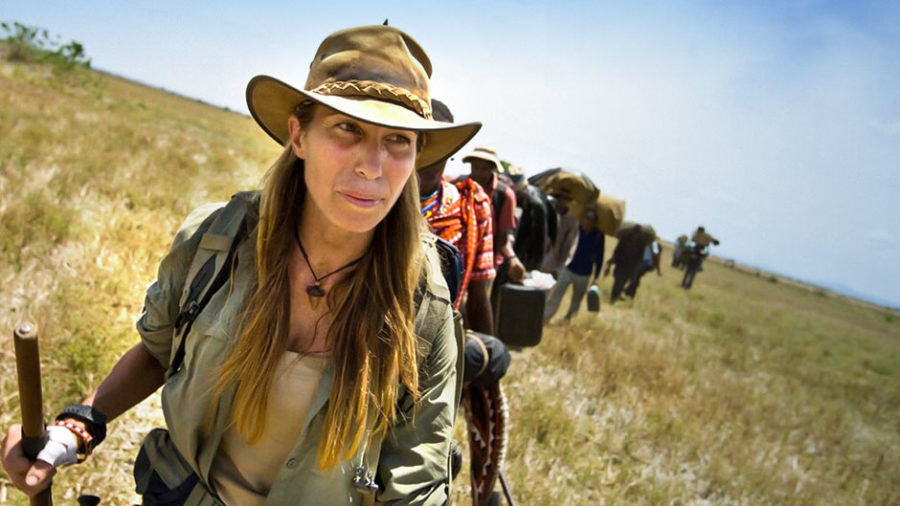
The Event
The talk will be the inaugural event in the Explorers & Innovators Lecture Series at Florida International University. It is free and open to the public, begins at 4:30 p.m. and will take place at the Student Academic Success Center Auditorium, MMC (11200 SW 8th St. Miami, FL 33199). Both Earle and Mayor encouraged our Keys community to attend and join the conversation.


